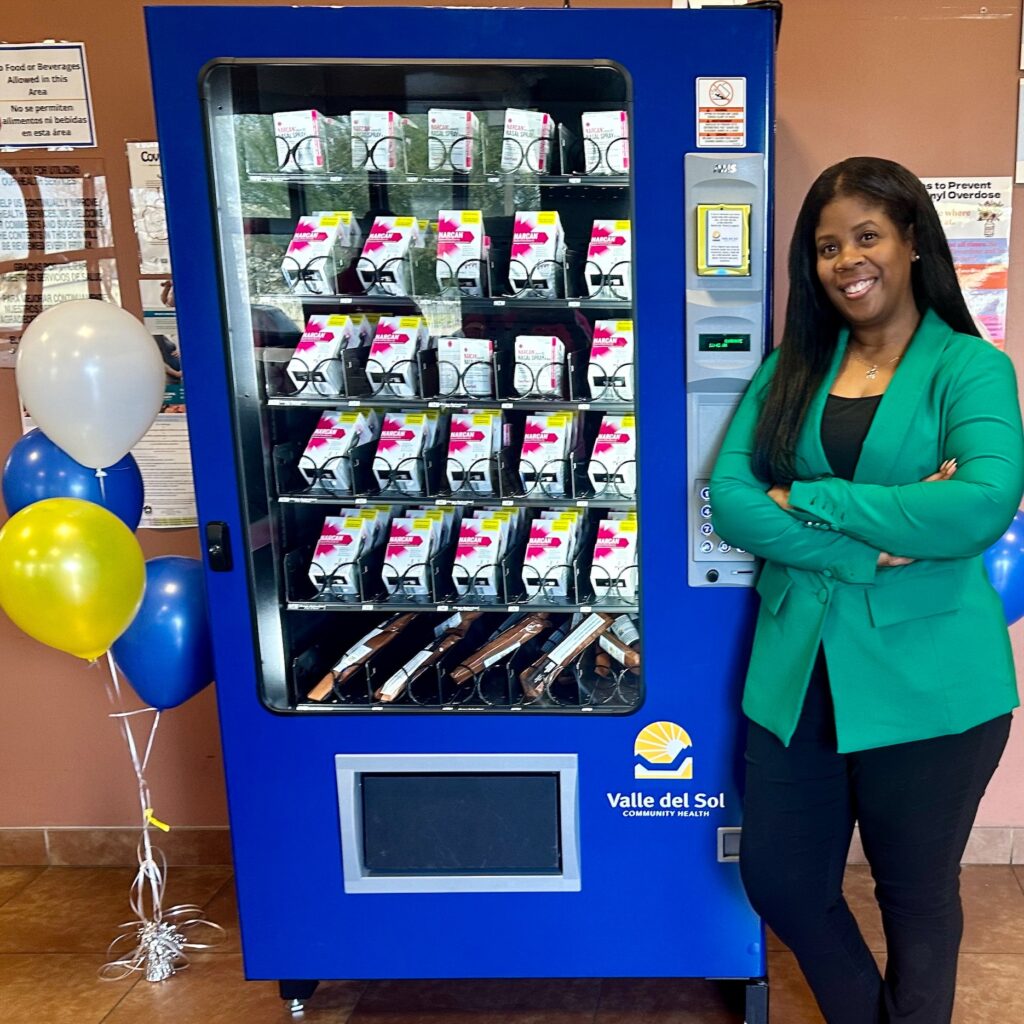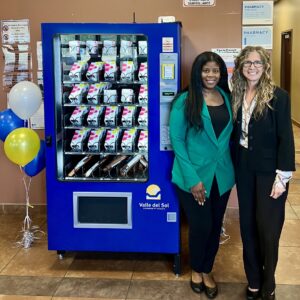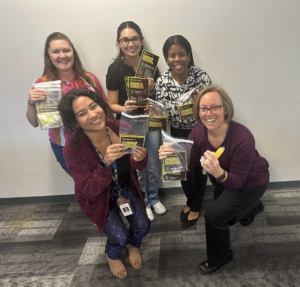Saving Lives, One Dose at a Time: Narcan Vending Machines Expand Access Through Arizona’s Community Health Centers

Melinda Cobb poses next to one of the first Narcan vending machines at Valle del Sol's First Avenue and Yuma Street location.
In the fight against the opioid crisis, Arizona’s community health centers are stepping up in a big way. Since early 2024, Narcan vending machines – designed to distribute the life-saving opioid reversal drug naloxone (the generic term for Narcan) anonymously and free of charge – have been popping up in clinics across Maricopa County. These machines are already helping people reverse overdoses and prevent tragedies.
But this initiative didn’t happen overnight – and it didn’t happen by accident.
The idea to deploy Narcan vending machines in Arizona came from Melinda Cobb, special projects manager at the Arizona Alliance for Community Health Centers (AACHC). She first encountered the concept in 2018, when she heard about the dispensers, which look like conventional vending machines, in cities on the East Coast. Years later, as Arizona’s opioid-related deaths continued to climb, the idea resurfaced – and Melinda saw a way forward.
“I kept thinking about the barriers people face when asking for naloxone and how that prevents access,” she said. “These machines break down those barriers. No questions, no judgment – just help.”
With Melinda’s vision, AACHC partnered with community health centers like Valle del Sol, Terros Health, Adelante Healthcare, Circle the City, Native Health, and Mountain Park Health Center to make it a reality.
What They Are – and Where They Are
The vending machines are stocked with Narcan nasal spray, fentanyl and xylazine test strips, and other supplies. They are free to use, require no personal information, and are designed to be discreet and accessible. Machines can be either free-standing or wall-mounted, depending on the space and needs of the location.
As of March 2025, Maricopa County has seven active Narcan vending machines installed at community health centers:
- Valle del Sol (South Phoenix and Mesa locations)
- Terros Health (two locations in Phoenix)
- Adelante Healthcare (Phoenix and Mesa locations)
- Circle the City (Phoenix)
An eighth Narcan vending machine was delivered to Circle the City’s Downtown Family Health Center in Phoenix in March. Its go-live date is yet to be determined.
More machines are on the way:
- Native Health is on track to receive three machines—two in Phoenix and one in Mesa.
- Mountain Park Health Center is set to receive nine machines, including one each in Phoenix and Tempe, and seven additional machines with locations to be determined.
The placement of each machine is strategic – focused on neighborhoods with high opioid use and overdose rates. One early site, Valle del Sol’s clinic near First Avenue and Buckeye Road in South Phoenix, serves a community heavily impacted by the crisis.
We caught up with Melinda Cobb to talk about the program, the progress so far, and what’s next.

Melinda Cobb and Lisa Nieri, chief programs officer for AACHC.
What are the primary goals of the Narcan vending machine initiative?
The initiative is designed to reduce overdose deaths by increasing timely access to naloxone, especially for individuals who may hesitate to ask for it. By making Narcan available for free and without requiring personal information, the machines promote both accessibility and anonymity – key factors in encouraging more people to carry and use this life-saving medication when it’s needed most.
How is anonymity maintained?
The machines don’t require personal information. They’re placed in private, easily accessible locations so anyone can use them without fear of being seen or judged.
Are there educational programs to go with the machines?
Yes – AACHC and our partners are committed to public education. That includes training sessions, printed materials, and community outreach. We also offer training on how to use the machines if requested. Each machine includes clear instructions for administering Narcan.
What kind of data are you tracking to measure impact?
We’re looking at the number of doses dispensed, overdose reversals reported, distribution of other supplies, and user feedback. We also work with local health departments to track trends and assess our impact.
Any early data or results you can share?
Absolutely. From January through July 2024, just three sites distributed:
- Over 1,000 doses of Narcan
- 356 fentanyl test strips
- 334 xylazine test strips
- Hundreds of other supplies
One site reported six self-reported overdose reversals in the first month alone. These numbers represent lives touched – and in many cases, lives saved.

Melinda and team members from the Arizona Alliance for Community Health Centers show off Narcan kits they’ve packed for the machines.
What challenges have you faced?
People still have misconceptions about who uses naloxone. Maintenance and navigating regulations are also ongoing challenges. We’ve been working closely with community partners and educating the public to address these barriers.
Are there plans to expand?
Yes – we’re exploring partnerships with more community health centers and looking beyond clinical settings to place machines in places like libraries and community centers. The goal is to meet people where they are.
How can others help support this effort?
Organizations can partner with health centers to host or fund machines. Individuals and groups can advocate for funding or help spread awareness. For anyone interested, we welcome direct outreach to AACHC for more information.
Why It Matters
Community health centers have always been on the front lines of identifying and addressing health needs. They know their communities, they provide trusted care, and they’re uniquely positioned to mitigate risk in ways that work. The Narcan vending machine program is just one more way community health centers are showing up for their patients.
Melinda’s idea, years in the making, is now a growing movement. And it’s only getting stronger.
Want to get involved or learn more?
Visit www.aachc.org or reach out to AACHC to find out how you can support this life-saving initiative.
By Laura Hahnefeld
Director of Communications, Arizona Alliance for Community Health Centers